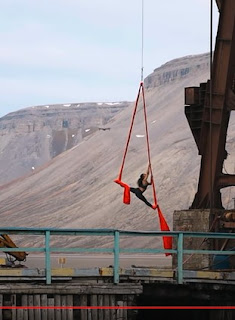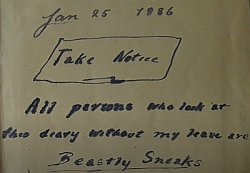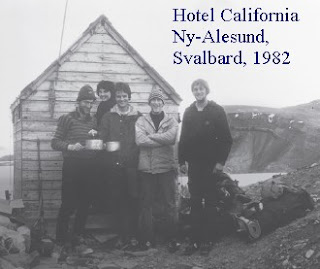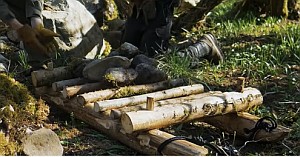I was in the yard the other day and heard a raucous cackle from our little woodland. I wish I could, from the sound alone, recognise the species. I wish I was better at sorting out hawks, buzzards and falcons in flight. I delight in the colours of bullfinch and kingfisher. But I'm not going to turn my life upside down to sort out the LBJs [little brown jobs] of which Ireland has a confusingly large number. I'll leave that to Dempsey and my friend Des. Here's a task for you:
Monday 29 November 2021
Obsession
Sunday 28 November 2021
Bunyan Bday 1628
- Supreme Court of Canada [R] in their official pre-holiday clobber
- Canada - hiking out from Coquihalla highway BC
- Canada - beachcombing wolves in BC
- Birdy - Evergreen
- Birds - trying to call home
- Birds - Deveaux's whimbrels Numenius phaeopus
- Pharma: Gerald Posner [prev book] interviewed
- Farmer: of course he is!
- Farmer: missing some sheep
- Bernd "Ravens in Winter" Heinrich still running at 80
Saturday 27 November 2021
Arwen Incommming
You may remember my piece-to-camera in September about the naming of 2021-22's storms: Arwen; Barra; Corrie; Dudley; Eunice; Franklin; Gladys; . . . It will be hard to take seriously a boy called Sue a storm named Dudley; but Storm Arwen is on us since yesterday:
For us, the ◎ circle marks the spot and 37km/h is pretty mild on the scale of storms. We are protected to a certain extend by a looming Mt Leinster to our immediate North. But the Northern coast is taking a pounding and an unfortunate driver in Antrim has been killed by a falling tree. While over on the bigger island, it is gusting 150km/h; trees are down; railways are blocked in Scotland; and sleety snow is adding to everyone's misery. Meanwhile, much further South Gdau.I reports snow in [the] Bath. Winter has begun.
Friday 26 November 2021
How to be An Old
More than a year ago, in the middle of the Summer lockdown, by virtue of my aged bones, I became eligible for a Free Travel Pass. I characterised this as the start of my Lunch in Longford Years. With Coronarama blazing through the country, I wasn't in a tearing hurry to vindicate my entitlements. But in the last week of November 2021, I was induced to take the train to Dublin to inch forward a venture which had been started as a WFH research project when scientific labs across the country were closed in a vain attempt to contain the spread of SARS-CoV2.
[It is not without irony that I spent a chunk of the morning in the very building where one of the earliest cases of "Skiing in Italy" covid made the news in early March 2020. At the time, TCD thought that sanitizing the lift to the 4th Floor would be sufficient response . . . hollow larf, lads!]
I'll also note that between booking the meeting in early November and actually being in the meeting, the daily covid cases doubled from 3K to 6K and the government started to tighten the screws on containment. I tend to mild travel anxiety, especially when venturing into unknown territory, which includes public transport during a plague year. But it turned out to be super easy because Irish Rail - a notoriously feather-bedded and inefficient quango - has made pre-booking and ticketing super easy and intuitive. There is a clear [travel pass] button which sets all the costs to €0 instead of €28. Having selected seats in both directions, you are delivered an 11 digit reservation number. The fancy new touch-screen ticket machines have a truly enormous key-pad that could be operated with the stump of a severed arm and the numbers are echoed of a size and contrast sufficient for all but the most severely vision-impaired. Those 11 digits, sufficient to count every human that has ever lived, is also enough to print a unique creditcard-sized paper ticket. Masks are obligatory as are selfies [R at the end of a 12 hour day in town].Did someone say in Town? Might projects are afoot in the Capital. The scheduled meeting was held in the EM Forster Seminar Room With A View on in the 6th floor of Trinity's TBSI. This is what you see looking NE over Docklands and Dublin Port - count the T-cranes! - it's like the Celtic Tiger all over again . . . but no accommodation for the homeless.
Wednesday 24 November 2021
Svalbard Пирами́да
Pyramiden is Episode 284 in Dan & Kika's world-ranging voyage in a little hi-tech yacht which the bought cheap and fitted out themselves after they met in Architecture School in Canada and then decided they didn't want to design workaday hospitals and apartments while they still had fire in their bellies and two pairs of knees to transport themselves when they arrive in port. It's an internet thing, like Leo Sampson's Tally Ho project, whereby couch-spuds like me sit on the sofa and watch creatives doing there thing Out There. A thousand coal-miners and dependents / managers / ancillaries used to work in the area before King Coal played out. When the company pulled out they left heaps of extracted but unexported coal locally and 20+ years later this is still being used to keep the lights on in the diminishing collection of buildings that haven't fallen into ruin or been filled up by landslides. Tour-ships come to visit and allow the top-dollar punters one hour in town to tick their bucket lists and boast to their neighbours when they return to Peoria or Osaka.
Dan and Kika get to hang around in midnight-daylight after all the visitors have buggered off back to Longyearbyen: having a couple of beers at $7 a bottle. Which is not insanely expensive compared to Oslo. Uma groupies will know the Kika does Aerial Silk acrobatics for fun and that why they had drone footage [R] of aetherial against a post-industrial backdrop against a polar desert backdrop.
Monday 22 November 2021
Solnit
I've complimented Rebecca Solnit on the quality of her semicolons but tbh her status as a public intellectual has been on the periphery of my attention. Which is silly because I've been content to be [a bit skeptically] washed over by the certainties of, say, Malcolm Gladwell or Steven Pinker. Not Richard Dawkins, though, he can go preen himself.
Solnit is perhaps most famous for getting her article The Uses of Disaster: Notes on Bad Weather and Good Government on postapoc kindness published in Harper's on the very day in 2005 that Hurricane Katrina whacked New Orleans and the delta. She paid attention to the unfolding drama of the Cajun Navy of little ships rescuing strangers from rooftops to eventually write that up as A Paradise Built in Hell: The Extraordinary Communities that Arise in Disaster [2009]. Contrary to what social [nature red in tooth and claw] Darwinists believe, it is not always a dog-eat-dog world when disaster strikes.
I'm now turning pages on Hope in the Dark: Untold Histories, Wild Possibilities [2004]. Or rather a later [2015] edition with a long forward and some extra chapters to flesh out her theme. Grim as the world was when Bush&Blair sexed-up their data and invaded Iraq in 2003, a lot more shit passed under the bridge through the next ten years: polarizing political discourse and degrading the planet.
One point Solnit notes is the distressing tendency for us to identify The Other and then assume that they are the opposition. It doesn't have to be thus as she discovers when her fellow leftie tree-huggers from San Francisco are on an environmental workshop in a remote Nevada village and have to share the bar with <frisson> ranchers. Because ranchers and ramblers are uneasy bed-fellows in the wilderness. But over a couple of beers and a bit of listening, it turns out that the livelihood, the patrimony, of ranchers depends on keeping the landscape undegraded and they've been achieving this for several generations. The real enemy are real-estate developers and the military-industrial complex.Sunday 21 November 2021
Rare ould times
- Killinkere, Co Cavan 1954 - how do you spell
Kilinkereemigration? - The favoritest tree in Melbourne
- Daft as a Fosh
- Duet
- Islandwurst - Enhanced actual reality without silly looking headsets
- PPE alert: No steel-caps for Vikings
- Cozzie idea for next Hallowe'en
- Suitings for chaps
- With one
hair-dryerleap, she was free - how to write a song
- Days of sail - Vasa cannons
- Ungreed Finnish style
- Roti generosity, Sikh style in BC
endnote
Friday 19 November 2021
Who shall be saved?
History is bunk . . . because it's written by the victors, or at least the survivors. Irving Finkel MultBlobPrev, the eccentric face of the British Museum, acquired a boxful of old diaries many years ago because it was too distressing to see them committed to a dumpster. Journal-keeping was not part of his culture growing up and perhaps his fascination with The Other - he speaks fluent Assyrian cuneiform - made him start reading. Finkel is a bit of a card with an understated sense of humor; reads supposed diary:
Mon: Got up, went to work, der dee der
Tue: Couldn't be bothered to cook anything; had a cold sandwich
Wed: Went out in the garden
Thu: Saw God . . .
Finkel and fellow diary-geek Polly North established a permanent collection of discarded diaries in London in 2009 called The Great Diary Project. They will last a lot longer than the record of my daily life recorded as e-mails through the 1990s: indeed that archive has already gone forever. And the GDP is still actively soliciting new/old material: they'll take anything diary-like because they have sufficient humility to refuse the task of gate-keeping: Who knows what will seem important to researchers in 200 years time?
Here's a youtube comment to one of the above-cited videos: I am thrilled to have discovered the Great Diary Project as a home for a very special diary. This covers the period 1810 to 1839 mostly in Somers Town, London, but also a trip to France and later to Yorkshire. I now live in Oregon, USA, and have mailed the diary to where it will be appreciated.
Thursday 18 November 2021
oooo mask data
God forgive me for sins in a past life but I found myself watching the schoolboy slaggin' that passes for government by democracy in the country next door. I guess I was suckered into it by, and I quote: "Apoplectic Speaker goes fully mental". This is not to hold up Dáil debates as the epitome of Ciceronian cut-and-thrust. And in any case, the debate is irrelevant here because I noted that St Jacob of Mogg [prev] disdained to wear a mask in this crowded and poorly ventilated room. Two snap shots:
Conservative benches:
Labour benches:
Tally [excluding Starmer and Johnson as actually speaking]:
Con masks v nomask = 27:22 = 55%
Lab masks v nomask = 27:0 = 100%
Wednesday 17 November 2021
Pharmaaaaaargh
MegaPharm has seen the serial consolidation of thousands of competing pharmaceutical firms into a couple of handfuls of huge, rich, multinational conglomerates with turnover greater than most countries [there are 228 countries]. Ireland ranks 35th with a revenue of $93billion, but is disconcertingly pwned by the pharmaceutical industry with thousands of voter's wages dependent on pharma production lines across the country.
| Pharma | Revenue | Country | Revenue | Rank |
| J&J | $56bn | Ukraine | $56bn | 51 |
| Pfizer | $52bn | Qatar | $52bn | 53 |
| Roche | $49bn | Chile | $51bn | 54 |
| Novartis | $47bn | Slovakia | $43bn | 55 |
| Merck | $47bn | Pakistan | $43bn | 56 |
| GSK | $44bn | Algeria | $41bn | 57 |
| Sanofi | $40bn | Peru | $35bn | 58 |
| AbbVie | $33bn | Kazakhst. | $30bn | 59 |
| Takeda | $31bn | Luxemb. | $28bn | 63 |
| 上海PH | $27bn | Morocco | $27bn | 64 |
GSK Started small in 1830 as Smith & Gilbert . . . & Kline [1870] & French & Richards [1891] & Nathan [1947] & Horlicks [1969] & Beecham [1990] & Glaxo Burroughs Wellcome [2000]. There are, of course, economies of scale: big facilities are more efficient than small. But those big facilities demand more sales so that the [capital intensive] production lines are never idle. MegaCorp can reduce the wage bill on the manufacturing side by off-shoring production to Indonesia or Ireland but the herds of "detail-men" coursing about the country talking to prescribers in their surgeries are mostly white, mostly men and all on delivery bonus. Their salaries, and those copy-editting in the advertising department, are part of the reason for the handsome retail mark-up over production costs.
The other reason is the claim that developing novel therapies is intrinsically expensive . . . because novel - so many bright ideas scattered on the floor of Reality Station: failed at one of the many stages where the creative spark is walked up the hill to a safe drug that actually works to alleviate suffering. Doesn't work in a Petri dish; doesn't work in mice; doesn't work women; does work in some women but kills a disconcerting number of other women. Not to worry about that though, if the FDA prevents sales in the USA, there is a vast market in South & Central America.
It didn't have to be like this. Posner's thesis is that the growth and development of the American Pharmaceutical industry went in a particular direction because of Arthur Sackler: a charmer who had a way with words and a relentless entrepreneurialism: so many companies, so many wholly-owned subsidiaries so many inter-dependencies. Posner had to become a forensic accountant to shovel through a mountain of documentation to determine that Sackler (or his brothers or his wives or his cronies) was the beneficial owner a named $$$ company with a registered address somewhere in America or Europe. He realised that doctors were the key nexus in the distribution of drugs: if you could get your product front-and-centre with a GP then there were potentially hundreds of sales to the doctor's patients. Direct mailing of promotional copy, often masquerading as objective impartial science, helped as did free samples to try on vulnerable patients. Side-effects? Contra-indications? there was nothing to be gained by emphasising those! And the detail-men who appeared, all smiles, in person: they were trained more in empathy than in evidence.
The competitive marketing which Sackler started and was taken up by everyone else in the industry - except The Losers - meant that far more scripts were filled than was strictly necessary. This worked serially for
- A for antibiotics - penicillin, tetracyclin, etc. each in turn developed anti-biotic resistant strains like MRSA and CRE. As we blame the Chinese for Covid-19, so we should blame the USA as the breeding ground of untreatable pathogens through the 1950s and 1960s
- 80% of US antibiotic pharma goes to farmers! 140,000 tonnes annually mostly as growth promoters and/or prophylaxis against overcrowding in feedlots
- Psychotropics: Valium, Librium, Adderall, Prozac, Xanax . . . 600 million scripts in the USA in 2018 costing $30 billion. That's only $50 a pop: huge numbers of sales means the price is low for each. Contrast with orphan diseases with only a few punters: Vimizim costs 10,000x more per dose.
- Oral contraceptives and hormone analogs. Diethylstilbestrol was widely prescribed for a variety of real and imaginary ailments. Alan Turing was chemically castrated with this estrogen-like chemical before he committed suicide. Estrogens have a wide variety of physiological functions beyond regulating the menstrual cycle and the side-effects of oral contraceptives indicate the extent of that empire: blood-clots, cancer, stroke. It didn't help that decades of women were give 10x more estrogen than was needed for preventing pregnancy.
- Orphan drugs - meant to help folks suffering from minority diseases - is being flim-flammed into an excuse to charge $whatever+50% because The feds will pick up the tab
Monday 15 November 2021
Eponymous adzeAx
You need the right tool for the job. If you're just futzing around in a corner of the haggard clearing nettles and "dirt", then anything with a steel edge will do: a scythe, a bill-hook, a shovel. But to work for hours, it's definitely worth investing in something fit for purpose and preferably fit for your build. Thus my well-used and much beloved scythe is adjustable for the spacing of the handles and the pitch of the blade. Someone with longer legs or shorter arms should really adjust the settings or use their own cutter. Like wise if you're five-feet-nothing you're better off sawing the last foot off the handle of your shovel. Apart from my scythe, the handiest implement in my tool-shed is my azada - a Spanish chopping spade. It's downward action is the best for tilling a potato patch or clearing a drain. You basically cannot buy one in Ireland, which is a loss.
Let's hear it for Ed Pulaski, the leader of a fire-crew in the Idaho Hills during the Big Blowup of 1910 when 1 million hectares of forest from Montana up into British Columbia went up in smoke. Fire is no respecter of an international border. A change of wind caused the blaze to surround Pulaski's crew of 45 foresters. But, knowing the local terrain from long experience, he led the crew to an abandonned mine adit and forced them to stay there lying on the ground until danger was past. 40 of the men survived many of them injured from burns and smoke inhalation [Microdocumentary by Steffen Riley].We only know this story because in the following years Pulaski developed and pushed a particular design of chopper which came to be named eponymously: it's not an ax-adz or an adze/axe or even a Pulaski Ax it's a Pulaski. During the 1930s, this design spread out from the Northern Rockies all over North America with the appro of the US Forest Service. The front end is a (razor-sharp) axe for felling brush and brashing larger trunks. The other side of the shaft sports a heavier-duty curved blade for chopping roots and dirt, and generally depriving the fire of fuel. Seems to do the job. But really the basic design goes back 2,000 years to the Roman legionary's dolabra.
Talking of antient historie, I'll give a shout to Pat the Salt's favorite tool-about-the-site: the griffán or graff which is superficially identical to a Pulaski. It's a pick-axe with two blades: one at right-angles to the other: a wider grubbing blade backed by a shorter sharper blade that destroys tree roots. Much heavier than my azada so not imo useful unless you have biblically stony ground to break up . . . as last Saturday when we were planting trees.
Sunday 14 November 2021
Sunday Fourteen
- Private Eye, satirical magazine, was founded 60 years ago. Current editor Ian Hislop reflects [R]
- Olde times? Sinclair in the 1980s - minute 59 for local connexion.
- Older times: vikings were a mixeDNA bag
- Older runs: Hurricane Hawkins [105] runs 100m
- Ked'la Gueule, Transhumance, Rondeau . . . avec paroles. The process. Practice your
FrenchBéarnaise - When I'm dead with Eric Bogle
- Weaving the sea into submission with fascines - basketry alert
- Nazaré waves - hydrogeology alert
- Gravitational waves - Schiehallion alert
- What's in a name? Transalert
- Capucine Korenberg: MicroForensics of Hokusai's Wave [preview]
- 24 pounder long guns: experimental history in Sweden
- Citroën DS - historical engineering in France
- Evergiven in dry-dock - inertia, origami in China
Friday 12 November 2021
And now I'm easy
Wot's it all about, then? John Green, youtube person, was reflecting on being grateful for having enough [4mins] and thankful that he was side-stepping the precarity [technical term] which besets that half of the world which exists on $2-a-day. It was flagged on MetaFilter where some wag put up the alternative Key Largo view of wanting more and more.
I had the huge [unintended consequences] advantage of having a brilliant older brother. At some early stage I reckoned that I'd never match that, so I stepped off the merry-go-round. I tell my kids that my ambition genes were shot off in the war. [soccer]I was much better as Left Back than Centre Forward[/soccer]. When you're 7, a 10 y.o. brother may have seemingly unattainable skills; when you're 67 the playing field is pretty much levelled. But those early pressures and choices do set the clock.
It's always been easy for me to achieve good enough. And indulge myself in a little subversive piss-taking directed at The Man. That's substantially because I was born white & ♂ into a professional home in 1954: in 1986 we bought a home that cost 1.4x my then humble govt salary. A starter home for Dau.I is as near as dammit 14x her govt salary. That makes her living much more precarious than mine ever was. I was talking to my elderly [older even than me!] neighbour at the time of 2008 crash and bail-out. She remembered life being pretty hard chaw as a farmer in the 1980s recession. But she said brightly "At least, poor as we were, we had no debt". The bill of goods which our society has been sold [have now, pay later; have more now; everyone in the office has more] means that balancing the books is way harder.
I never got tenure at . . . Anywhere U; indeed I never secured a permanent job and my pension is shot full of holes; but I had 40 years in science and now I'm easy
Wednesday 10 November 2021
Re-evaluating certainties
It's Science Week from Sunday 07 to Sunday 14 Nov 2021. This national festival of STEM has been formally funded in the 2nd week of November for the last tuthree years. 2020 -- 2019 -- 2018 -- 2017. Wexford Science Café has been there, trying to boost our numbers and spread the Joys of STEM. I unloaded the responsibility of convening the WxScCaff this year and so all I have to do is rock up.
There is a bit of money sloshing about to support Science week down in the provinces and this year it was enough to commission a film by local Film Company Crannog Media. We cast about for a couple of handfuls of science-folk who'd go in front of the camera and decided that the topic would be
At the Cafésession last night, we watched the film and then opened the floor to discussion. A couple of people remarked that very few of the contributions actually described an evidence-based change of mind since Feb 2020. Whoa! lads. I've had three good ideas during 45 years of science which might be equivalent to a seismic shift in my thought patterns. So the chances that one of these events will have occurred in the last 20 months is zero to the nearest whole number. But it's hard to shake lose the idea that scientists are no more prone to having creative insights than poets or chartered accountants . . . and we do cherish our hypotheses rather than really go at them with the 🪓hatchet of skepticism. Always, always treasure your exceptions with Wm Bateson.
Monday 8 November 2021
Outposts
A. Why, of course, you'd grow up to become an artist and explorer yourself.
Of course it doesn't always work out like that: I didn't join the navy and was never in charge of anything, let alone a crew of 600 and 200m of warship. Travel, of which I have been a keen consumer, has involved far more turning the pages of a book than turning over vegetation to reveal leeches and snakes. The genre was given its modern timbre by a pair of books - Brazilian Adventure and One's Company - published in the 1930s by Peter Fleming: older brother of Ian "007" Fleming. Fleming is the quintessence of British stoic aplomb. Maybe not quite dressing for dinner in the jungle but having an unassailable gift for wry humour and intrepid pushing on because going back is really not quite the thing a chap does. After WWII, this mode of travel was carried forward, with some hilarity by Eric Newby and Redmond O'Halloran; and much later by Bill Bryson.
The picture at the top shows Tim Richards père and others outside their Arctic accommodation which is as big as the garden shed behind our house. That was the pot of nostalgic gold which defined the arc of Dan Richards fils trajectory. The thesis of his book Outposts is that striving for distant and inaccessible places can turn a spot-light on a pilgrim's mettle. Sometimes things only qualify as "fun" in the recall but if you never go near the edge you'll die anyway eventually; perhaps without having lived. The outpost-hopping starts repairing sæluhús with/for Ferðafélag Íslands - the Icelandic equivalent of Scotland's Mountain Bothy Association MBA. Sæluhús translates literally as joy-houses because that's what you feel when one of these primitive shelters is espied from afar through a break in roiling ground-level clouds; the alternative being either a) a bleak night's sleep or b) death by exposure. Later, he persuades a Scots pal to join him on a 150km ramble through the Cairngorms sampling the delights of the MBA's rough hospitality.
In between Dan tunes into Le Phare du Cordouan which features as a refuge in the film Diva. This is not inaccessible to anyone who can muster €44 and 4 hours for the jaunt from the coast of Aquitaine. But getting to the top gives a sense of achievement and allows the mind to reflect on what it must have been like when the West coast of Europe was the end of the world.
It takes a little longer to get to Desolation Peak in Washington state where Beatnik Jack Kerouac spent two month lord of all he surveyed as a fire-watcher in 1956. Kerouac parlayed that brief and somewhat unsatisfying experience into a string of best-selling books which dangled like a carrot in front of the next two generations of wilderness wannabees. Most of us cannot bear our own company for longer than a weekend and would go bonkers to be exposed to the social deprivation of solitary exfinement for weeks at a stretch. While there Dan gets to hang with Jim Henterley [prev].
After several other contrived adventures, the final chapter takes Dan to Svalbard but not as remote on that remote enough place to match his dad's furthest North at Hotel California. Here, after actually seeing a polar bear with two cubs, in their native habitat he reflects, not without introspection, on humanity's place in Nature. WTF is he doing hauling fat-arsed carbon footprint to the distant Arctic when the creatures he comes to see are done-for because the ice is melting from the collective carbon footprint. It's not "fine" but it is trite to make the connexion between flying and snow-mobiling to view the goddamn bears too direct. Bitcoin and FAANG is nixxing the ice far more effectively than all the destination tourists who have ever been to Svalbard. And you, yes you me, who are virtuously Friendfaceless and compost the carrot-tops . . . you'll have to give up the chest-freezer, the central-heating and the car before you can chid Dan for going to the World's End.
The adventures are "contrived" because this is Richards' fourth book and his idea needed a deal of research and forward planning to come off. It's an [ad] venture to invest so many weeks at a desk thinking what can be done with a finite budget and working out when and where is possible. And when all the travelling is done, many more weeks are required at the desk putting the pieces into a coherent order. But the jokes are not, cannot be, contrived: they spring spontaneously from the self-deprecating adversity in which The Plan has dumped The Author. I laughed: the baton has been passed from Fleming and Newby to another writer who uses travel as a way to explore what it is to be human and alive.
Sunday 7 November 2021
Sunday hilarity
- Rob Banks at Security Expo: Max Fosh alert
- Enough int enough: John Green alert
- Niche for nesters? Flat-hunting in NYC
- The spy who
came instayed out in the field for the coffee - Laura? makes a better bench
- Drabgreen Pantone 448C is world's least attractive colour
- BRANTson Pickle
- Post-hallowe'en pumpkin dropped from a great height.
- Publishing null results: a study
- Peter 🚲 Sagan sprints
- Flush Ireland - sewage to sea
- Vikings in the Azores [bloboprev] - summarized in 10m
Friday 5 November 2021
Mad or misinformed
Last [2020] Summer, for the first time in 25 years the windows of our home became a holocaust for thrushes Turdus philomena and other birds. In noticeable numbers these creatures would fly into the glass at speed and kiill themselves. After a number of these collisions we covered the windows with bright post-its to lessen the chance of them reflecting, and looking like, the sky. It may have worked - or all the birds flying under this misapprehension had offed themselves - but eventually we stopped hearing these fatal thunks. And this year 2021, the geomagnetic anomaly has shifted to Wexford and we didn't get a repeat performance of the tragedy.
However, round about Hallowe'en, we started to hear fluttery thumps on three of the windows which all seemed to be caused by a blackbird Turdus merula which was jumping up from the sill and making repeated, aggressive, flapping attacks on the window-pane. If we knocked on the window, or even appeared close to the glass, the perp would fly quickly away chattering. This is really too late in the year to be mating or nesting, but maybe it's never too late to assert your dominance and see off a rival bird of the same species.
The major consequence for us, is that in his excitement the bird is shitting purple poos on our white[ish] window-sills. I begin to see why Linnaeus named this genus Turdus.
Wednesday 3 November 2021
In the field
Research is quite fractal, science can reveal
- width of the known Universe [= 46.5 billion light years this week, more next month]
- the length of human chromosome 21 [= 48 million bases]
- life the Universe and everything [=42]
What's not to love about a paper entitled "No time to die: An in-depth analysis of James Bond's exposure to infectious agents", published this year in Travel Medicine and Infectious Disease. The three authors, all expert epidemiologists from Nijmegen and London, watched 25 Eon-produced films released between 1962 and 2021 (∼3113 min of evening hours per author that were not-spent on more pressing societal issues or forms of relaxation that are more acceptable in academic circles). From these data they abstracted 86 James Bond 007 adventures that involved foreign travel.
The lowlights of these escapades include: "Food safety also appears to take a backseat to Bond's appetites. He regularly eats unwashed fruit . . . fails to wash his hands, neglecting both the risk of bacterial infection and the lack of toilet facilities during the ensuing boat chase . . . unhealthy when it comes to his level of alcohol consumption . . . drinking straight from a field-drain in Egypt".
They conclude that Bond's death-wish risk-taking is consistent with infection by Toxoplasma gondii caught from Blofeld's cat. Toxoplasma has been associated with changes in behaviour in mice and humans which make it more like that the carrier will be gobbled up by a predator and complete the life-cycle of the parasite.I imply that those lowlights are clipped from the original paper, and they are, except for the last one. I made that one up from the sagas of another friend of mine who, as a PhD student in the early 1990s, was sent out to the Developing World to bleed cattle, sheep and goats, capture their DNA and discover previously uncertain evidence about the process of domestication. This is the same bloke who blagged the elderly Treasurer of Prestigious University to sign off a wodge of folding money from a government grant as cash under the line-item 6.3.1 Bribes. Tales came back of what this chap was prepared to eat and where he was prepared to sleep, which boggled the mind of us bacon-and-cabbage stay-at-homes. A couple of times, a few days after returning home, he was checked into the Cherry Orchard Fever Hospital in Ballyfermot for observation and flush-through of a wild variety of bacterial and protozoan parasites. As they say, what kills not, fattens and he's now MD of a biotech company valued last year at €50 million. So the risk of setting up and growing a small campus company paid off!
eeee, y'have to larf.
Monday 1 November 2021
Optimization
Metafilter flagged up for me a youtube project a bit like Leo Sampson's project to rebuild the Tally-Ho, a 110 year old sailing boat. Julius and Dylan, two 20-something cousins, started building an iron-age round house in Ireland on Mayday last year and just finished in the middle of October 2021.
That first, foundation, episode is an interesting exercise it optimization: what is the most efficient way of transporting fist-to-skull-sized stones from the river to the building site? Clearly carrying them one at a time is not it. While carrying too many at once invites a hernia.
When I was 10 or 11, the school decided to build a new science block . . . on the cheap. In those ununionized times it seemed reasonable to have the fit, young, male teachers do a certain amount of the labour in the Summer evenings preparing for the next day's work by the actual builders. They hadn't invented Health&Safety or PPE in those far off days and we schoolboys were encouraged to lark about on the site and even bear a hand in the tasks. I remember me and palomino loading two wheelbarrows with a single concrete block each and racing from the block pile to the scaffolding. I also remember thinking about whether it was better to plod across the site with a lot of blocks or fly them across one-a-time. Somewhere in between, for sure. Apart from efficiency, a few years ago, my second best, second-hand wheelbarrow collapsed when I loaded it with too much spoil from the drain.
Dylan and Jules start off by loading an iron-ago wicker basket with stones and carrying that load suspended from a pole between their two shoulders. There is some discussion of the tare and nett weight when load-bearing apparatus is involved. 25 years ago, when we bought our old farm; languishing in one of the sheds was an exact pre-Massey-Ferguson replica [but with milled timber and nails] of the solution D & J come to [see R]. In episode 2, they acquire a horse! to do the heavy dragging.And they have let the river do a lot of work in cleaning and grading the stones. Wave-washed Chesil Beach on the South coast of England does this sorting on a grand 30km scale. At the Iron Age hill fort of Maiden Castle 20km inland, archaeologists found caches of even-sized sling-stones clearly mined from this section of the beach. Or maybe that bit was made up by archaeologist Mortimer Wheeler in the 1930s - the sling-shots having been fetched from the beach in his Model-T Ford.




















